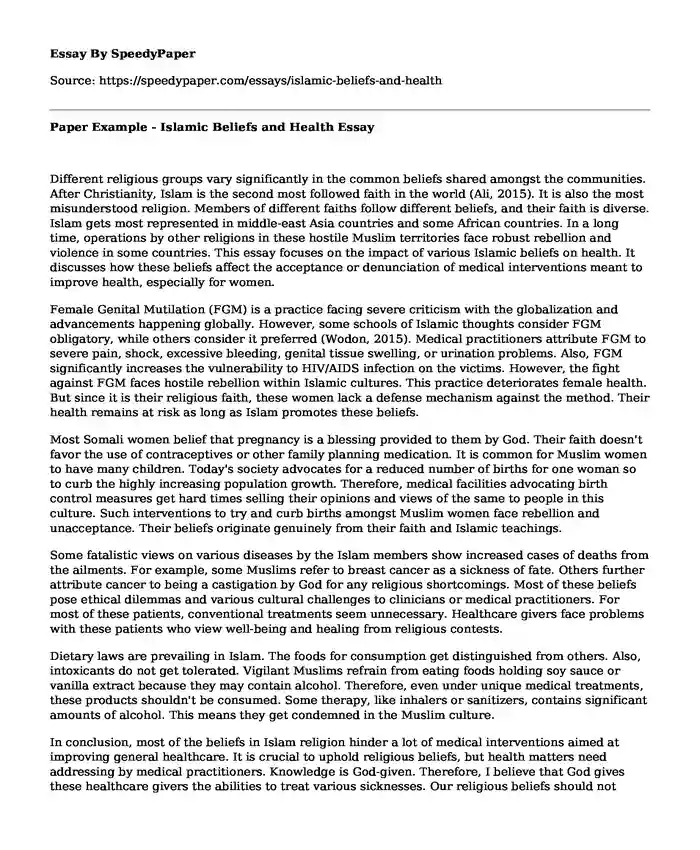
| Type of paper: | Essay |
| Categories: | Women Discrimination Islam Healthcare |
| Pages: | 3 |
| Wordcount: | 591 words |
Different religious groups vary significantly in the common beliefs shared amongst the communities. After Christianity, Islam is the second most followed faith in the world (Ali, 2015). It is also the most misunderstood religion. Members of different faiths follow different beliefs, and their faith is diverse. Islam gets most represented in middle-east Asia countries and some African countries. In a long time, operations by other religions in these hostile Muslim territories face robust rebellion and violence in some countries. This essay focuses on the impact of various Islamic beliefs on health. It discusses how these beliefs affect the acceptance or denunciation of medical interventions meant to improve health, especially for women.
Female Genital Mutilation (FGM) is a practice facing severe criticism with the globalization and advancements happening globally. However, some schools of Islamic thoughts consider FGM obligatory, while others consider it preferred (Wodon, 2015). Medical practitioners attribute FGM to severe pain, shock, excessive bleeding, genital tissue swelling, or urination problems. Also, FGM significantly increases the vulnerability to HIV/AIDS infection on the victims. However, the fight against FGM faces hostile rebellion within Islamic cultures. This practice deteriorates female health. But since it is their religious faith, these women lack a defense mechanism against the method. Their health remains at risk as long as Islam promotes these beliefs.
Most Somali women belief that pregnancy is a blessing provided to them by God. Their faith doesn't favor the use of contraceptives or other family planning medication. It is common for Muslim women to have many children. Today's society advocates for a reduced number of births for one woman so to curb the highly increasing population growth. Therefore, medical facilities advocating birth control measures get hard times selling their opinions and views of the same to people in this culture. Such interventions to try and curb births amongst Muslim women face rebellion and unacceptance. Their beliefs originate genuinely from their faith and Islamic teachings.
Some fatalistic views on various diseases by the Islam members show increased cases of deaths from the ailments. For example, some Muslims refer to breast cancer as a sickness of fate. Others further attribute cancer to being a castigation by God for any religious shortcomings. Most of these beliefs pose ethical dilemmas and various cultural challenges to clinicians or medical practitioners. For most of these patients, conventional treatments seem unnecessary. Healthcare givers face problems with these patients who view well-being and healing from religious contests.
Dietary laws are prevailing in Islam. The foods for consumption get distinguished from others. Also, intoxicants do not get tolerated. Vigilant Muslims refrain from eating foods holding soy sauce or vanilla extract because they may contain alcohol. Therefore, even under unique medical treatments, these products shouldn't be consumed. Some therapy, like inhalers or sanitizers, contains significant amounts of alcohol. This means they get condemned in the Muslim culture.
In conclusion, most of the beliefs in Islam religion hinder a lot of medical interventions aimed at improving general healthcare. It is crucial to uphold religious beliefs, but health matters need addressing by medical practitioners. Knowledge is God-given. Therefore, I believe that God gives these healthcare givers the abilities to treat various sicknesses. Our religious beliefs should not hinder the progress of improving the health of society in general. Faith is meant to keep us morally upright, not unhealthy.
References
Ali, M. M. (2015). The religion of Islam. Ahmadiyya Anjuman Ishaat Islam Lahore USA.
Wodon, Q. (2015). Islamic law, Women's rights, and state law: the cases of female genital cutting and child marriage. The Review of Faith & International Affairs, 13(3), 81-91.
Cite this page
Paper Example - Islamic Beliefs and Health. (2023, Feb 15). Retrieved from https://speedypaper.com/essays/islamic-beliefs-and-health
Request Removal
If you are the original author of this essay and no longer wish to have it published on the SpeedyPaper website, please click below to request its removal:
- Shakespeare's Hamlet and Two of Its Mysteries, Literary Essay Sample
- HRM Essay Sample: Effective Communication in the Laying Off of Employees
- Position Paper Sample on Homeland Security Department and Terrorism Issue
- Intercultural Communication - Free Essay Sample for Your Inspiration
- Essay Sample on Homelessness and housing unaffordability
- Free Essay: Edinburgh Financial Modeling and Optimization
- Martin Luther King's Inspiring Speech: End Segregation, Obtain Equal Rights - Essay Sample
Popular categories




